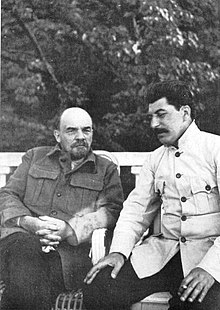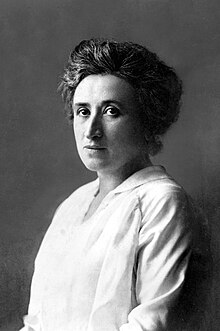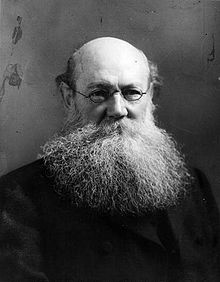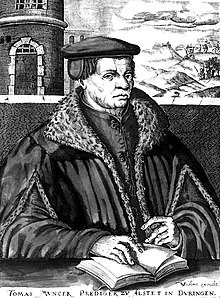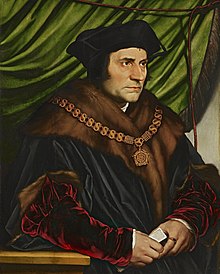
Leninism is a political ideology developed by Russian Marxist revolutionary Vladimir Lenin that proposes the establishment of the dictatorship of the proletariat led by a revolutionary vanguard party as the political prelude to the establishment of communism. The function of the Leninist vanguard party is to provide the working classes with the political consciousness and revolutionary leadership necessary to depose capitalism in the Russian Empire (1721–1917).
Marxism–Leninism is a communist ideology that was the main communist movement throughout the 20th century. Developed in Russia by the Bolsheviks, it was the state ideology of the Soviet Union, Soviet satellite states in the Eastern Bloc, and various countries in the Non-Aligned Movement and Third World during the Cold War, as well as the Communist International after Bolshevisation. Today, Marxism–Leninism is the ideology of the ruling parties of China, Cuba, Laos and Vietnam, as well as many other Communist parties. The state ideology of North Korea is derived from Marxism–Leninism. Marxist–Leninist states are commonly referred to as "communist states" by Western academics. Marxist–Leninists reject anarchism and left communism, as well as reformist socialism and social democracy. They oppose fascism, imperialism, and liberal democracy. Marxism–Leninism holds that a two-stage communist revolution is needed to replace capitalism. A vanguard party, organized through democratic centralism, would seize power on behalf of the proletariat and establish a one-party socialist state, called the dictatorship of the proletariat. The state would control the means of production, suppress opposition, counter-revolution, and the bourgeoisie, and promote Soviet collectivism, to pave the way for an eventual communist society that would be classless and stateless.
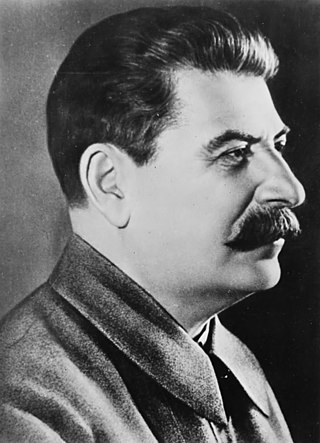
Stalinism is the means of governing and Marxist–Leninist policies implemented in the Soviet Union from 1927 to 1953 by Joseph Stalin. It included the creation of a one-party totalitarian police state, rapid industrialization, the theory of socialism in one country, collectivization of agriculture, intensification of class conflict, colonization of Eastern Europe, a cult of personality, and subordination of the interests of foreign communist parties to those of the Communist Party of the Soviet Union, deemed by Stalinism to be the leading vanguard party of communist revolution at the time. After Stalin's death and the Khrushchev Thaw, de-Stalinization began in the 1950s and 1960s, which caused the influence of Stalin’s ideology begin to wane in the USSR. The second wave of de-Stalinization started during Mikhail Gorbachev’s Soviet Glasnost.

Totalitarianism is a form of government and a political system that prohibits all opposition parties, outlaws individual and group opposition to the state and its claims, and exercises an extremely high if not complete degree of control and regulation over public and private life. It is regarded as the most extreme and complete form of authoritarianism. In totalitarian states, political power is often held by autocrats, such as dictators and absolute monarchs, who employ all-encompassing campaigns in which propaganda is broadcast by state-controlled mass media in order to control the citizenry.
Soviet and communist studies, or Soviet studies is the field of historical studies of the Soviet Union and other Communist states as well as historical studies of the Communist parties that existed or still exist in some form in many countries, both inside and outside the former Eastern Bloc, such as the Communist Party USA. Aspects of its historiography have attracted debates between historians on topics including totalitarianism and Cold War espionage.

The Zhenotdel (Женотдел), the women's department of the Central Committee of the All-Russian Communist Party (Bolsheviks), was the section of the Russian Communist party devoted to women's affairs in the 1920s. It gave women in the Russian Revolution new opportunities until it was dissolved in 1930.

The first five-year plan of the Union of Soviet Socialist Republics (USSR) was a list of economic goals, created by Communist Party General Secretary Joseph Stalin, based on his policy of socialism in one country. The plan was implemented in 1928 and took effect until 1932.
Jewish Bolshevism, also Judeo–Bolshevism, is an anti-communist and antisemitic canard, which alleges that the Jews were the originators of the Russian Revolution in 1917, and that they held primary power among the Bolsheviks who led the revolution. Similarly, the conspiracy theory of Jewish Communism alleges that Jews have dominated the Communist movements in the world, and is related to the Zionist Occupation Government conspiracy theory (ZOG), which alleges that Jews control world politics.
Communism is a left-wing to far-left sociopolitical, philosophical, and economic ideology within the socialist movement, whose goal is the establishment of a communist society, a socioeconomic order centered around common ownership of the means of production, distribution, and exchange that allocates products to everyone in the society. Communist society also involves the absence of private property, social classes, money, and the state. Communists often seek a voluntary state of self-governance but disagree on the means to this end. This reflects a distinction between a more libertarian approach of communization, revolutionary spontaneity, and workers' self-management, and a more vanguardist or Communist party-driven approach through the development of a constitutional socialist state followed by the withering away of the state. As one of the main ideologies on the political spectrum, communism is placed on the left-wing alongside socialism, and communist parties and movements have been described as radical left or far left.
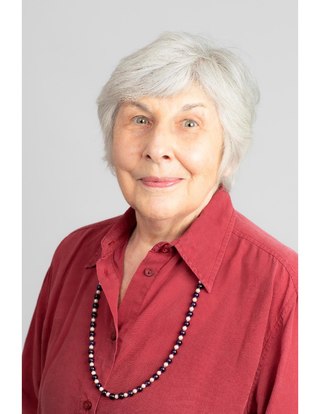
Sheila May Fitzpatrick is an Australian historian, whose main subjects are history of the Soviet Union and history of modern Russia, especially the Stalin era and the Great Purges, of which she proposes a "history from below", and is part of the "revisionist school" of Communist historiography. She has also critically reviewed the concept of totalitarianism and highlighted the differences between Nazi Germany and the Soviet Union in debates about comparison of Nazism and Stalinism.
Red fascism is a term equating Stalinism, Maoism, and other variants of Marxism–Leninism with fascism. Accusations that the leaders of the Soviet Union during the Stalin era acted as "red fascists" were commonly stated by anarchists, left communists, social democrats and other democratic socialists as well as liberals and among right-wing circles.

Mass killings under communist regimes occurred through a variety of means during the 20th century, including executions, famine, deaths through forced labour, deportation, starvation, and imprisonment. Some of these events have been classified as genocides or crimes against humanity. Other terms have been used to describe these events, including classicide, democide, red holocaust, and politicide. The mass killings have been studied by authors and academics and several of them have postulated the potential causes of these killings along with the factors which were associated with them. Some authors have tabulated a total death toll, consisting of all of the excess deaths which cumulatively occurred under the rule of communist states, but these death toll estimates have been criticized. Most frequently, the states and events which are studied and included in death toll estimates are the Holodomor and the Great Purge in the Soviet Union, the Great Chinese Famine and the Cultural Revolution in the People's Republic of China, and the Cambodian genocide in Democratic Kampuchea.
This is a select bibliography of post World War II English language books and journal articles about the Revolutionary and Civil War era of Russian (Soviet) history. The sections "General Surveys" and "Biographies" contain books; other sections contain both books and journal articles. Book entries may have references to reviews published in English language academic journals or major newspapers when these could be considered helpful. Additional bibliographies can be found in many of the book-length works listed below; see Further Reading for several book and chapter length bibliographies. The External Links section contains entries for publicly available select bibliographies from universities.
This is a select bibliography of post World War II English language books and journal articles about Stalinism and the Stalinist era of Soviet history. Book entries have references to journal reviews about them when helpful and available. Additional bibliographies can be found in many of the book-length works listed below.
This is a select bibliography of English language books and journal articles about the post-Stalinist era of Soviet history. A brief selection of English translations of primary sources is included. The sections "General Surveys" and "Biographies" contain books; other sections contain both books and journal articles. Book entries have references to journal articles and reviews about them when helpful. Additional bibliographies can be found in many of the book-length works listed below; see Further Reading for several book and chapter-length bibliographies. The External Links section contains entries for publicly available select bibliographies from universities.
This is a select bibliography of post World War II English language books and journal articles about the Russia during the First World War, the period leading up to the war, and the immediate aftermath. For works on the Russian Revolution, please see Bibliography of the Russian Revolution and Civil War. Book entries may have references to reviews published in English language academic journals or major newspapers when these could be considered helpful.
Christopher Read is a British historian of the Soviet Union.

This is a select bibliography of English-language books and journal articles about the history of Ukraine. Book entries have references to journal reviews about them when helpful and available. Additional bibliographies can be found in many of the book-length works listed below. See the bibliography section for several additional book and chapter-length bibliographies from academic publishers and online bibliographies from historical associations and academic institutions.

This is a select bibliography of English language books and journal articles about the History of Central Asia. A brief selection of English translations of primary sources is included. Book entries have references to journal articles and reviews about them when helpful. Additional bibliographies can be found in many of the book-length works listed below; see Further Reading for several book and chapter-length bibliographies. The External Links section contains entries for publicly available select bibliographies from universities. this bibliography specifically excludes non-history related works and self-published books.
This is a select bibliography of English language books and journal articles about the history of Poland. A brief selection of English translations of primary sources is included. Book entries have references to journal articles and reviews about them when helpful. Additional bibliographies can be found in many of the book-length works listed below; see Further Reading for several book and chapter-length bibliographies. The External Links section contains entries for publicly available select bibliographies from universities and national libraries. This bibliography specifically excludes non-history related works and self-published books.



